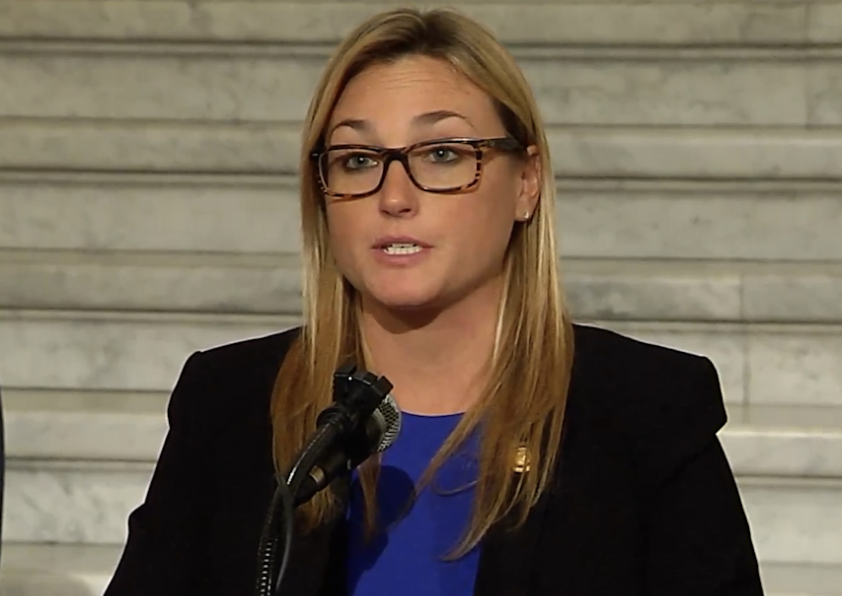Pennsylvania Republicans are bringing their historic $13 billion tax cut to the House, hoping to pressure Democrat Gov. Josh Shapiro and the Democratic-controlled House to include tax cuts in negotiations.
“Democrats in Harrisburg continue spending and propose even more future spending of your hard-earned money on an endless number of government programs that do not benefit working, middle-class people,” said Rep. Martina White (R-Philadelphia).
The tax cut proposal, which would be the largest in state history, has already passed the GOP-controlled Senate. It was a response to Shapiro’s budget, which would use some of the state’s $14 billion Rainy Day Fund to increase spending for education and mass transit.
Rather than cuts, Shapiro would spend an additional $2.5 billion in taxpayer funds.
There’s enough money in the Rainy Day Fund to keep the government open for around 50 days in lieu of a government shutdown.
Republicans on Tuesday said Shapiro’s proposed $48.3 billion spending spree won’t benefit the Keystone State residents he claims to represent. Instead, said White, Republican tax cuts will help those who need it most.
“These tax cuts, which passed the Senate with overwhelming bipartisan support, are a solution designed to provide much needed financial relief to the backbone of our commonwealth, working class people,” White said.
The GOP tax cuts would take full effect in a five-year window, with some cuts — like cutting the personal income tax from 3.07 percent to 2.8 percent — fully in effect as of 2025.
What may have an even bigger impact on the state would be eliminating the Gross Receipts Tax on electric energy.
Rep. Josh Kail (R-Beaver) said eliminating the tax makes Pennsylvania more competitive because it cuts bills on families and large manufacturers, leading to more jobs.
“The governor always talks about losing to other states – losing to Ohio, jobs going other places, people moving to other places. Well, if you look at the places where there is growth, you’ll also see competitive tax policies…We have to change how we tax people,” Kail said.
The Tax Foundation has argued the Gross Receipt Tax leads to higher prices for businesses and consumers due to tax pyramiding where taxes are levied multiple times on goods and services as they go through the production process.
The Senate passed tax cut legislation on May 7 by a 36 to 14 vote with eight Democrats joining majority Republicans.
At the time, Senate Majority Leader Joe Pittman (R-Indiana) said it was more important to put money back in the hands of Pennsylvanians instead of letting the government pick what to fund. “Lower tax structures help to further grow an economy, and in this care, would lift all boats,” he said.
A Shapiro spokesperson welcomed the GOP proposals and said it was proof that they recognized the need to invest in Pennsylvania’s future.
“We look forward to continuing to work together with the only divided legislature in the country to make critical investments in our Commonwealth,” Shapiro spokesperson Manuel Bonder told DVJournal.
The government hopes to avoid a similar budget impasse that it ran into last year where the budget wasn’t finalized until late December.
Shapiro’s lofty spending goals ran into criticism from free-market groups and the state’s Independent Fiscal Office (IFO).
IFO Director Matthew Knittel told the Senate Appropriations Committee in February that Shapiro’s administration was too optimistic about state revenue. The IFO put revenues more than $820 million lower than Shapiro’s projections.
Knittel also warned the General Fund and Rainy Day Fund surpluses could be exhausted by 2026-2027.
The Commonwealth Foundation has argued that the state government can not use the Rainy Day Fund for Shapiro’s proposals because they involve the creation of new programs.
State law said the Rainy Day Fund can be used only for “emergencies involving the health, safety, or welfare of the residents of this Commonwealth or downturns in the economy resulting in significant unanticipated revenue shortfalls…”
Pennsylvania House Democrat leadership did not respond to a request for comment.
The budget deadline is June 30.

